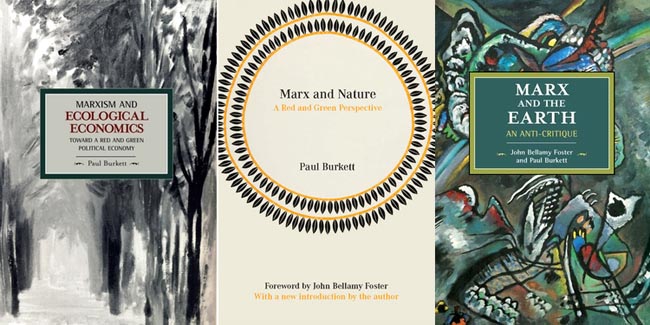by John Bellamy Foster
Paul Burkett’s death on January 7, 2024, at age 67, means that the world is suddenly bereft of the figure who played the leading role over the last three decades in developing a Marxist ecological economics in the face of the growing planetary crisis. His loss leaves ecological Marxism without its foremost exponent of the ecological critique of capitalist value relations. It also means the loss of a warm and compassionate human being, and a beloved jazz musician.
With regard to his main body of work directed at ecosocialism, Burkett indicated to me on a number of occasions in recent years that his analysis of Karl Marx and nature and Marxist ecological economics was essentially complete, present in his intellectual corpus as a whole. He had, as he recognized with characteristic modesty, produced a rich system of thought that was analytically sharp, with immense depth, on which others could build. What follows here are some notes intended to provide a sense of the development of his thought.
Much of Burkett’s published work in the late 1980s and early ’90s was directed at the theory of monopoly capital, some of which focused on Paul Sweezy’s early economic writings. In December 1990, he wrote his first article for Monthly Review titled “Poverty Crisis in the Third World: The Contradictions of World Bank Policy.” It was, in my view, a tour de force, as important a critique today as when it was written. I have referred to it in every course I have taught on political economy and the environment in the last thirty-plus years. He followed this up with the publication of another five articles in MR over as many years.
In the mid-1990s, Burkett’s focus shifted to Marx and the environment. The growth of ecosocialism in the 1980s and early ’90s led to the development of first-stage ecosocialism, in which Marx was castigated for supposedly anti-ecological, Promethean views. What emerged under the name of ecosocialism was a hybrid approach that grafted standard liberal Green theory, with its neo-Malthusian biases, onto a narrowly conceived critique of political economy.
Burkett, who had written his dissertation on economics and the environment, began to devote his research efforts to a defense of historical materialism, responding to what he considered major misunderstandings of the ecological analysis embedded in Capital and Marx and Frederick Engels’s many other writings. I was similarly engaged at that time in countering the then common environmentalist distortions of Marx. Burkett and I thus entered into an extensive theoretical correspondence on these issues, which stretched over years and then decades.
By 1996–1999, Burkett and I were no longer simply trying to correct gross misinterpretations of Marx on ecology, but rather were engaged in a much more affirmative way in unearthing Marx’s long neglected ecological critique of capital. In developing this analysis, we consciously adopted a kind of division of labor with Burkett concentrating on the economic-value aspects, while I focused on the historical-philosophical-scientific questions. This resulted in the publication in 1999 of both Burkett’s Marx and Nature: A Red and Green Perspective (St. Martin’s Press/Haymarket) and my article “Marx’s Theory of Metabolic Rift: Classical Foundations for Environmental Sociology” (American Journal of Sociology), followed by the publication the next year of my Marx’s Ecology: Materialism and Nature (Monthly Review Press, 2000). In the preface to my book, I wrote:
“Paul Burkett’s magisterial work Marx and Nature: A Red-Green Perspective (1999) constitutes not only part of the background against which this work was written, but also an essential complement to the analysis provided here. If I have sometimes failed to develop fully the political-economic aspects of Marx’s ecology, it is because the existence of [Marx and Nature] makes this unnecessary and redundant.”
Marx and Nature, “Marx’s Theory of Metabolic Rift,” and Marx’s Ecology initiated a whole new approach to the environmental critique for the twenty-first century, sometimes referred to as second-stage ecosocialism, based on the recovery of Marx’s extensive ecological critique (while also encompassing the notion of a third stage integrating ecosocialist theory and practice in our time). Often designated as metabolic rift theory, the form of analysis was equally rooted in the ecological value-form analysis that Burkett had definitively traced throughout Marx’s work.

Paul Burkett and his ‘dear one,’ Zann Carter
The restored ecological Marxist tradition was also seen as tied to a dialectical naturalism in line with classical historical materialism. Crucial to this outlook was a rejection of any epistemological break between the early Marx and the mature Marx (or between the mature Marx and late Marx), conceiving Marx’s analysis instead as having passed through a dialectical process of continuity and change. Likewise, the notion of a fundamental breach between Marx and Engels was rejected. Instead, their analyses, while clearly differentiated, were seen as complementing each other.
However, the new socio-metabolic approach, since it challenged first-stage ecosocialist analysis by bringing Marx and Engels back into the argument, led to deep divisions within ecosocialist theory. This was manifested most clearly in my sudden removal in 1998 from the editorial board of the journal Capitalism Nature Socialism (CNS), founded by the Marxist economist James O’Connor, where both Burkett and I had been active editorial board members and contributors. This was followed by the publication of five extensive polemics in the journal directed against Marx’s Ecology. Burkett’s response was to write a strong defense of Marx’s Ecology and to resign on principle from the editorial board of CNS, acting as always with absolute integrity. The result of these events was the establishment of a distinct second-stage Marxian ecology, divorced from the first.
In what was to be the most intellectually fertile period of his career, Burkett went on to write China and Socialism Market Reforms and Class Struggle with economist Martin Hart-Landsberg (Monthly Review Press, 2004), while also developing his major theoretical treatise in ecological economics, Marxism and Ecological Economics: Toward a Red and Green Political Economy (Haymarket, 2006). This formidable work, which provided a critique of mainstream ecological economics, was so powerful and prescient that it can be seen as even more significant today than when it was first written, directly tying into the struggle over the financialization of “natural capital” and the relation of this to ecological economics (see John Bellamy Foster, The Dialectics of Ecology [Monthly Review Press, 2024]).
Consonant with this work, Burkett wrote what I think can be considered his signature piece, “Marx’s Vision of Sustainable Human Development,” published in Monthly Review in October 2005. In this article, he showed that Marx’s ecological analysis had to be conceived as one of sustainable human development, which was the basis of his whole conception of a future socialist society. As Burkett showed, Marx had envisioned this most fully in some of his later works, such as the Critique of the Gotha Programme and his letters (and draft letters) to Vera Zasulich.
Burkett suffered a major family tragedy in his later years, which led him to turn away to a considerable extent from research and writing, though he would resume his ecological work on occasion, particularly when the overall analysis that we had developed with respect to Marx’s and nature seemed to be at risk. Although the first-stage ecosocialist attack on Marx as a so-called Promethean thinker had been roundly dispatched with the rise of metabolic rift theory and second-stage ecosocialism, a number of other related claims purporting to show that Marx was an anti-ecological thinker persisted within ecological economics and ecosocialism. The most important of these was the myth that Marx had neglected (or even scorned) the views of Sergei Podolinsky, often characterized as the very first ecological economist, who had sought to relate Marxian value theory to the second law of thermodynamics. The second charge was that Engels had rejected the entropy law. The classical founders of historical materialism were further accused of having ignored the role of fossil fuels in the capital accumulation process while also failing to recognize the intrinsic value of nature.
Spurred by these other criticisms leveled at Marx and Engels, Burkett and I wrote Marx and the Earth: An Anti-Critique (Haymarket, 2016). In order to refute the Podolinsky myth, it was necessary to arrange translations of the Italian and German versions of his work into English, to gain access to Marx’s unpublished notes on Podolinsky in his extract notebooks, and to engage in a thorough investigation into the history of nineteenth-century thermodynamics. In all of this, Burkett played a major part. The result was to demonstrate that claims of Marx and Engels’s supposed summary rejection of Podolinsky, and thus of ecological economics, had no basis whatsoever, and that Podolinsky’s own work suffered from serious ecological fallacies.
Likewise, the notion that Engels had rejected the second law of thermodynamics was shown to be false, since he had merely rejected the questionable corollary of the heat death of the universe. Nor, it was discovered, had Marx and Engels neglected the questions of fossil fuels and intrinsic value. The analysis in Marx and the Earth thus completed the response to first-stage ecosocialism. The recent publication of Marx’s notes on Podolinsky in the Marx-Engels-Gesamtausgabe has only served to reinforce these conclusions.
Burkett came out of his self-imposed retirement once again at my urging in order to write “Value Isn’t Everything” with me (Monthly Review, November 2018). Here, the issue was persistent attacks on Marx’s theory of value as anti-ecological, based on the failure to understand that the law of value for Marx was not a grand idealistic-moral concept, but rather the basis for understanding how capitalism actually worked, including how it failed to value the environment. Ironically, attempts by some thinkers on the left to apply the concept of economic value to everything in material existence, from stones to the stars, has had the effect of eliminating the historical specificity of capitalism, including the causes of its environmental depredations. Burkett’s analysis of Marx’s ecological value analysis in Marx and Nature can be seen as the most sophisticated critical analysis in this realm, to which it is necessary to return again and again if we are to move forward in this area.
Burkett’s last big concern, voiced in 2023, was regarding Kohei Saito’s book Marx in the Anthropocene (Cambridge, 2023). He had been very complimentary toward Saito’s Karl Marx’s Ecosocialism (Monthly Review Press, 2017—see his “Some Notes on Kohei Saito’s Karl Marx’s Ecosocialism,” Climate and Capitalism, January 8, 2018). But, as he wrote to me in June 2023 with respect to Saito’s more recent work, “I have been too easy on Saito’s textual quirkiness in the past. He seems to want to create a differentiated product to enhance his notoriety. It’s disappointing to see him embrace the old Engels versus Marx myth.”
Such a statement emanating from Burkett seemed to presage a new critique of ecological distortions of Marx, which would undoubtedly have had the effect of drawing him out of his self-imposed retirement once again. But it was not to be. This time he was too ill. Today, the defense of a credible Marxian ecology will have to depend on others building on his work.
In his last years, Burkett, aka PapaPatty, spent as much time as he could playing the saxophone in his jazz band, as well as solo. For him, this was a social practice. It is in this capacity, consonant with everything for which he stood in life, that he would no doubt most want to be remembered. Remember him we will.
Reposted, with permission, from Monthly Review, March 2024



